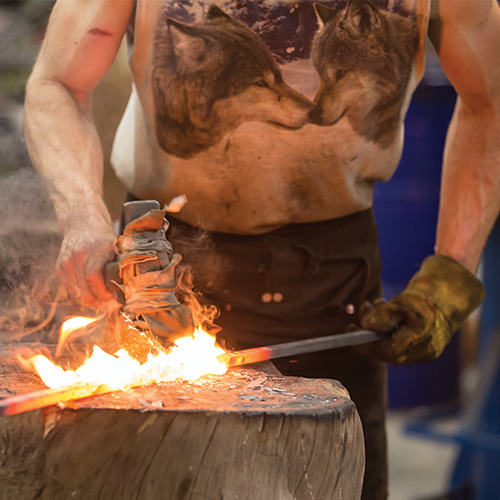Chapter Sixteen. Talent or Tenacity

A lucky break is one thing, but doing something with it is another. Henry Rollins was working a minimum-wage job at an ice cream shop when his favorite band, Black Flag (a popular punk rock band), called him on the shop phone. During a concert the weekend before, Rollins had jumped onstage and sung with the band like a wild man. Something about his energy left a memorable mark. Now the band was in need of a new lead singer and frontman. They called Rollins to see if he wanted to try out.
He listened in shock as the band invited him to audition. He stared at the ice cream scoop in his hand and then in a flash decided, “Why not?” Henry Rollins went on to front the band to huge success. Decades later, he considers this the best decision of his life.
Rock On
Rollins summarized the journey this way: “My life is a story of a lot of luck and taking advantage of a lot of opportunity and working really damn hard. And that’s it. And that’s not a unique story. I got a lucky break, but at least I did something with it.”
Belief, luck, and positive thinking are mush without the courage to fight. Success always requires less wishbone and more spine. When asked about his talent in an interview, Rollins shot back, “I don’t have talent; I have tenacity. I have discipline and I have focus. And I know, without any illusion, where I come from and where I can go back to.” When we look at someone standing onstage, we may wrongly attribute their accomplishment to hidden talent that we don’t have. But talent is one of the greatest misunderstood concepts of the day. Talent is overrated. To excel you need skill. As Will Smith put it, “Talent you have naturally. Skill is only developed by hours and hours and hours of beating on your craft.” And when it comes to living the life for which you were designed, we all start in the same humble spot: square one. Whether a punk rocker, a novelist, or president of the United States, it takes tenacity to rise to the top. There is no shortcut to success.
Never Give Up
The now-famous Jack London wasn’t always so. He grew up in a working-class home and was a fighter from the start, getting in schoolyard scuffles even as a young kid. His family couldn’t afford school after the age of 13, so he dropped out and went to work earning ten cents an hour in a canning factory. London worked 18-hour days and continued to spar his way through whatever life pitched his way. He picked up a series of odd yet adventurous jobs: illegal oyster thief, deckhand, sailor, and so on. Along the way, he discovered a love of books, and he learned to capture and reframe what he witnessed with written words on a page. Writing became his way to share his adventures, grapple with the complexities of life, and funnel his fervent desire to savor every drop from life’s cup.
London’s thirst for experience and adventure was vast. At 21 he followed the crowds north to take part in the Klondike Gold Rush madness of the time. The Yukon wilderness was frigid and cold, and after a series of hardships and adventures, London returned home with his pockets nearly empty. Impoverished but not defeated, he desperately needed to find work. Brimming with visceral memories from his trip, he committed himself to a strict regimen of writing based on what he had seen. Hoping his writing would fetch some cash, he submitted his work, only to be rejected again and again.
During that time London wrote to a friend, “I have never been so hard up in my life. If I die, I shall die hard, fighting to the last.” In desperation he pawned everything of value he owned, including his watch, bike, and winter coat. He wrote and wrote on a borrowed typewriter, but still the rejection letters came. One publication sent him this rejection note: “Interest in Alaska has subsided in an amazing degree. I do not think it would pay us to buy your story.” It seemed his adventures up north wouldn’t pay off after all. Little did London know, more rejection was to come. During his first five years as a writer he received an avalanche of over 500 rejection letters, but still he didn’t give up.
The Secret to Success
After his books became a huge success, London would say, “You have to go after inspiration with a club.” These words weren’t catchy ways to motivate others to get off their couch. London was literal. He knew what it meant to fight, and he had witnessed the way a club could be used in the Alaskan frontier. And this wasn’t just true for the beginning of London’s career. Years later in an interview he explained, “I’m damned if my stories just come to me. I have to work like the devil for the themes.” Writing was never easy, so he didn’t wait for inspiration to strike but chose habit instead, writing 1000 words every day of the year. London said, “There is no such thing as inspiration. I thought so once and made an ass of myself.” For London, inspiration was getting to work, and when he put pen to paper it was like hitting flint with steel.
Time Used Well
London’s rise from 13-year-old dropout to famous writer was not something that fell from the sky. It was the culmination of a huge exertion of force and a philosophical approach to life. London explained, “The proper function of man is to live, not to exist. I shall not waste my days in trying to prolong them. I shall use my time.” And use his time is what he did. London only lived to the age of 40, but in those years he wrote almost 50 books. How is it possible that someone could accomplish so much in so little time? Creative fight was the secret of his fame.
A Father’s Advice
Theodore Roosevelt was an energetic but small and sickly young boy. He was plagued with asthma (which was often fatal in that time) and general weakness, so his father decided to step in. Theodore Roosevelt, Sr., went to his twelve-year-old son and said, “You have the mind but you have not the body, and without the help of the body the mind cannot go as far as it should.” Theodore’s sister, an eyewitness of the event, recalled her brother’s response as a half-grin and half-snarl. Clenching his teeth, he committed to change. Without delay, he and his father built a gym in the house, where he would lift weights. And Teddy lived life to the tilt, hiking, exploring, and climbing mountains in all sorts of weather. Nothing seemed to hold him back.
As Roosevelt grew up, iron self-discipline and hard work became his habit, as biographer Edmund Harris wrote. And after a day full of exercise, boxing, voracious reading, rowing, riding, running, and adventure, “He would tumble into bed at midnight where he could luxuriate in healthy tiredness, satisfied that he had not wasted one minute of his waking hours.” Even though he started weak, throughout Roosevelt’s life his vitality, endurance, and unending energy became a hallmark of this indomitable man. Theodore was never one to give up no matter the cost; whatever obstacle he faced he seemed to tackle it with tenacious resolve.
One family friend described the college-age Theodore this way: “He’s not strong, but he’s all grit. He’ll kill himself before he’ll even say he’s tired.” On his summer breaks from Harvard, Roosevelt spent every spare minute in the great outdoors, rowing, sailing, swimming, and trekking through the countryside. But after he graduated, his asthma and “weak heart” still seemed to be an issue, at least for his doctor. Roosevelt’s doctor advised him to take a desk job and to avoid strenuous activity due to a heart condition. Roosevelt decided to climb the Matterhorn instead. But his doctor’s warnings were serious: “Your heart is weak and will not hold out for more than a few years unless you quietly settle down.” In typical Roosevelt fashion he replied, “I prefer an early death to a sedentary life.”
Average Isn’t Bad
As Roosevelt famously put it, “I am only an average man, but by George, I work harder at it than the average man.” Roosevelt worked hard at many things throughout his life. He was a naturalist, a boxer, a scholar, the author of 35 books, and president of the United States. One of the threads through it all was his unquenchable tenacity and fight. He overcame countless personal and professional obstacles, including the death of his mother and his wife on the same day. On that day he wrote, “The light has gone out of my life.” Yet somehow he pressed on. Roosevelt’s advice was simple: “Do what you can, with what you have, where you are.” This is perhaps the best credo ever written for the creative fight.
Too often in our own lives, a humble beginning is used as an excuse: “I’m not smart enough, tall enough, artistic enough, strong enough, funny enough...” But as any creative and successful person will tell you, that achievement hinges less on where you start and more on how much you are willing to try. When you peel back the layers, the most successful, creative, and prolific people are just your average individuals who have worked really, really hard.
Exercise
STEP 1
Write down 3–5 goals or dreams that you would like to achieve.
Get specific and write down the details in a journal or on a blank page.
STEP 2
Excuses keep us from achieving our goals and dreams.
On a scratch piece of paper, write down the excuses that are holding you back.
STEP 3
Take a moment to reflect on the excuses you have written down.
Then, as a symbolic act of defiance, burn or tear up the piece of paper.
STEP 4
Close your eyes. Take a deep breath and with a Teddy Roosevelt–like snarl,
recommit yourself to achieving your dreams.


